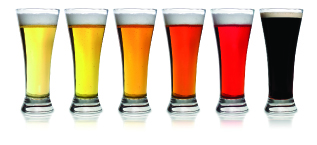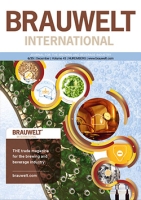Dr. Josef Schraedler, managing director of Germany’s Weihenstephan Brewery and Jim Koch, brewer and founder of Samuel Adams, announced today their partnership and plans to unveil a new style of collaboratively brewed beer this spring.
The new EC directive on colorants is creating multiple challenges for the food industry. In response, Symrise has restructured its SymColor® portfolio of colorants so that manufacturers can not only prevent labeling problems, they can also offer consumers natural foods.
BRAUWELT International met Klaus Bastian, the administrator and sole partner of Bagema, Bastian Getränkemaschinen (beverage machinery) GmbH, in Nittendorf/ Pollenried, Germany. The young company looks to the future in this supposedly hexed seventh year with great optimism.The global trading in used beverage machinery and complete
AB Åbro Bryggeri, Vimmerby, is Sweden’s third biggest brewery. After a few years of change, things have been looking up for some time. To stay on this positive path and to take account of the huge number of different bottles and label types (wet glue labels as well as self-adhesive aluminium labels) the company direction decided to invest in a new labelling machine, the “Labetta Duo 8/6/35 1320” of the Bavarian specialist Gernep GmbH in Barbing.
Using one single brew for a variety of different kinds of beers used to be a pipe dream. With its innovative approach BrewTopia, however, flavouring manufacturer Symrise does the impossible and opens new doors for the brewing industry.
BTB, Germany, with its sister company BTB Brew Technology (UK) Limited is one of the leading global companies buying and selling used breweries and beverage factories. BTB dismantles the plant and deals with transport, overhauling and worldwide reinstallation. Furthermore BTB plans, develops, and manufactures complete new KEG machines/lines and breweries in its new premises.
They selected a system based on the Rockwell Automation Logix Control Platform, consisting of Allen Bradley ControlLogix® programmable automation controllers (PAC) and 1756 I/O. They communicate with the existing DCS on Modbus™. Asia Pacific Breweries decided to migrate the brewhouse control system in phases. First, the company would replace the I/O modules and migrate them to a newer system. It needed a new I/O system that was open and modular and could be scaled for future growth. Second, the brewer had an aggressive goal to migrate each remote I/O panel during one eight-hour period of scheduled downtime — a process that can normally take several days. To help ensure that the upgrade was completed in the scheduled eight-hour period, Rockwell Automation and Asia Pacific Breweries approached this project with a pilot and ran a “dress rehearsal” of the planned upgrade.
Reports from the beverage industry of contaminations with spore-forming, rod-shaped bacteria strains belonging to the genus Bacillus are becoming more and more prevalent. These bacteria primarily require oxygen in order to reproduce and sporulate. Therefore, it is plausible that the uptake of oxygen during storage creates the perfect conditions for growth. Suitable growth conditions could potentially encourage any spores present in the packaged product to germinate into vegetative cells, which in turn could cause spoilage of the contents. As the majority of non-alcoholic beverages are usually low in pH, acid-tolerant Bacillus strains would have an advantage over other microorganisms. Within the scope of a research thesis, the growth characteristics of four acidophilic Bacillus species in various beverages were investigated.
The repercussions of a bad reputation are quite evident in the case of the cohumulone found in hops. This article offers a closer examination of the prejudices and false assumptions, which have been associated with cohumulone over a long period of time.
The results of a comparison of energy usage in various plants show that specific power consumption for providing refrigeration in German breweries runs between 2.8 and 6.5 kWh/hl. Energy consumption of a refrigeration plant is made up of actual refrigeration requirements on the one hand and plant efficiency or coefficient of performance on the other hand. This article focuses primarily on plant efficiency of compressor refrigeration units, even though refrigeration requirements themselves can, in many instances, also be pushed down by e.g. changing process parameters, reducing losses etc.




